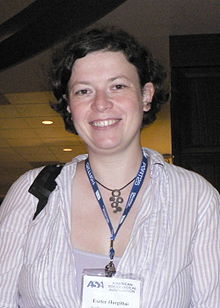Eszter Hargittai (born 1973[1] in Budapest, Hungary) is a communication studies scholar and Professor at the University of Zurich.
Eszter Hargittai | |
|---|---|
 Hargittai in 2008 | |
| Born | |
| Citizenship | Hungary, United States |
| Education | |
| Known for | |
| Awards | G. R. Miller Dissertation Award, National Communication Association, Young Scholar Award, International Communication Association |
| Scientific career | |
| Fields | |
| Institutions | |
| Doctoral advisor | |
Biography
editShe holds a BA in Sociology from Smith College and a PhD in Sociology from Princeton University where she was a Wilson Scholar.
Before moving to Zurich, she was Delaney Family Professor of Communication Studies and Faculty Associate of the Institute for Policy Research (IPR) at Northwestern University where she is still affiliated as Adjunct Professor and Fellow at IPR.
She was a fellow at the Center for Advanced Study in the Behavioral Sciences at Stanford (2006–2007), a fellow at the Institute for International Integration Studies, Trinity College Dublin (2007), and a fellow at Harvard's Berkman Klein Center for Internet & Society (2008–09) where she was on the Faculty Advisory Board until 2020.[2] She has been a member of the group blog Crooked Timber since 2003.[3]
Her research focuses on the social and policy implications of information technologies with a particular interest in how IT may contribute to or alleviate social inequalities.[4] She has studied the differences in people's Web-use skills, the evolution of search engines [5] and the organization and presentation of online content, political uses of information technologies, how IT are influencing the types of cultural products people consume, and geocaching.
Her work is regularly featured in the media.[6] She was interviewed about the Internet and its social implications on CNNfn's The Flip Side on 29 April 2004. Her work on the international spread of the Internet was referenced by Wired News [7] and cited in a United States Senate hearing.[8] Other coverage includes BBC News as well as the Chicago Tribune [9] The Washington Post,[10] The Wall Street Journal [11] and several other publications.
Notable publications
edit- ————, ed. (2009). Research Confidential: Solutions to Problems Most Social Scientists Pretend They Never Have. Ann Arbor: University of Michigan Press. doi:10.3998/mpub.268873. ISBN 978-0-472-07026-8. Archived from the original on 2012-09-14. Retrieved 2022-04-14.
References
edit- ^ Date information sourced from Library of Congress Authorities data, via corresponding WorldCat Identities linked authority file (LAF).
- ^ "Eszter Hargittai". Berkman Klein Center for Internet & Society. 2021-08-30. Archived from the original on 2021-07-30. Retrieved 2022-04-14.
- ^ "Say Hello to Eszter". Crooked Timber. 2003-09-25. Archived from the original on 2019-04-23. Retrieved 2022-04-14.
- ^ "Web Use Project". Web Use Project. University of Zurich. Archived from the original on 2022-03-05. Retrieved 2022-04-14.
- ^ ———— (2007-04-01). "The Social, Political, Economic, and Cultural Dimensions of Search Engines". Journal of Computer-Mediated Communication. 12 (3): 769–777. doi:10.1111/j.1083-6101.2007.00349.x. ISSN 1083-6101.
- ^ "Web Use Project Press". Web Use Project. University of Zurich. Archived from the original on 2022-01-19. Retrieved 2022-04-14.
- ^ Hundt, Reed (2000-10-12). "Hundt: Nader Should Back Gore". Wired News. Archived from the original on 2005-02-04. Retrieved 2022-04-13.
- ^ "Statement of Reed E. Hundt Before the United States Senate Committee on the Judiciary Subcommittee on Antitrust, Business Rights and Competition". United States Senate. 2001-05-01. Archived from the original on 2008-08-29. Retrieved 2022-04-14.
- ^ Skalka, Jennifer (2004-12-14). "Blue voter get word: Do". Chicago Tribune. Vol. 158, no. 349 (Final ed.). p. 1 – via Newspapers.com.
- ^ "Program Aids Urban Poor In Accessing The Internet". The Washington Post. 2004-08-09. Archived from the original on 2018-11-28. Retrieved 2022-04-14.
- ^ "The Wall Street Journal" (European ed.). 2000-01-26.